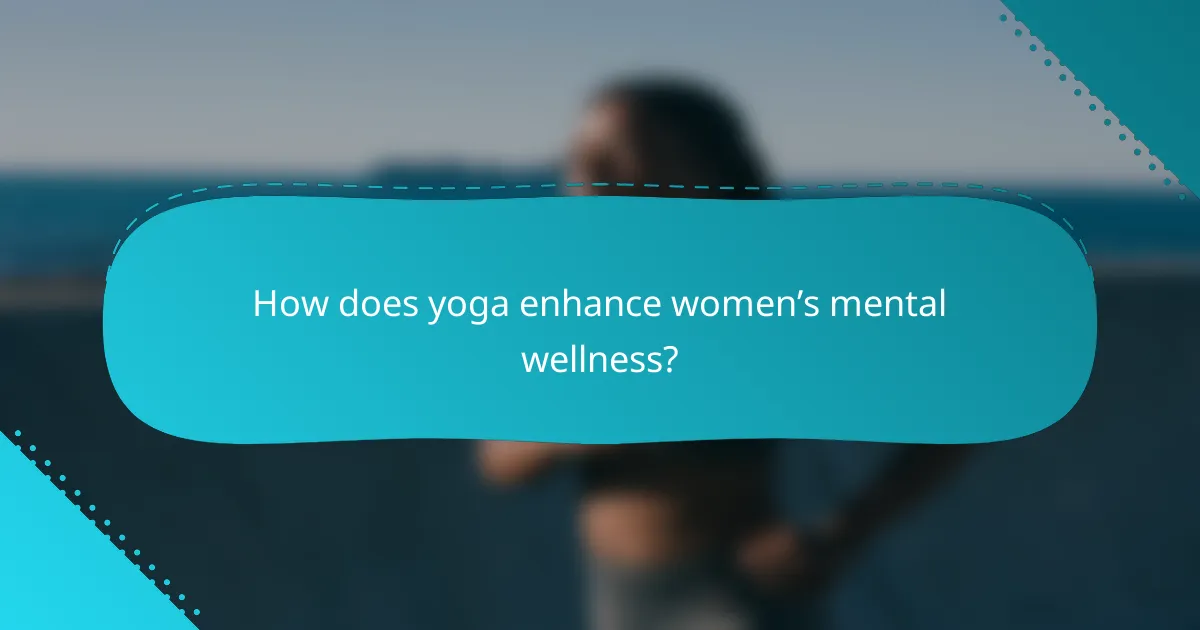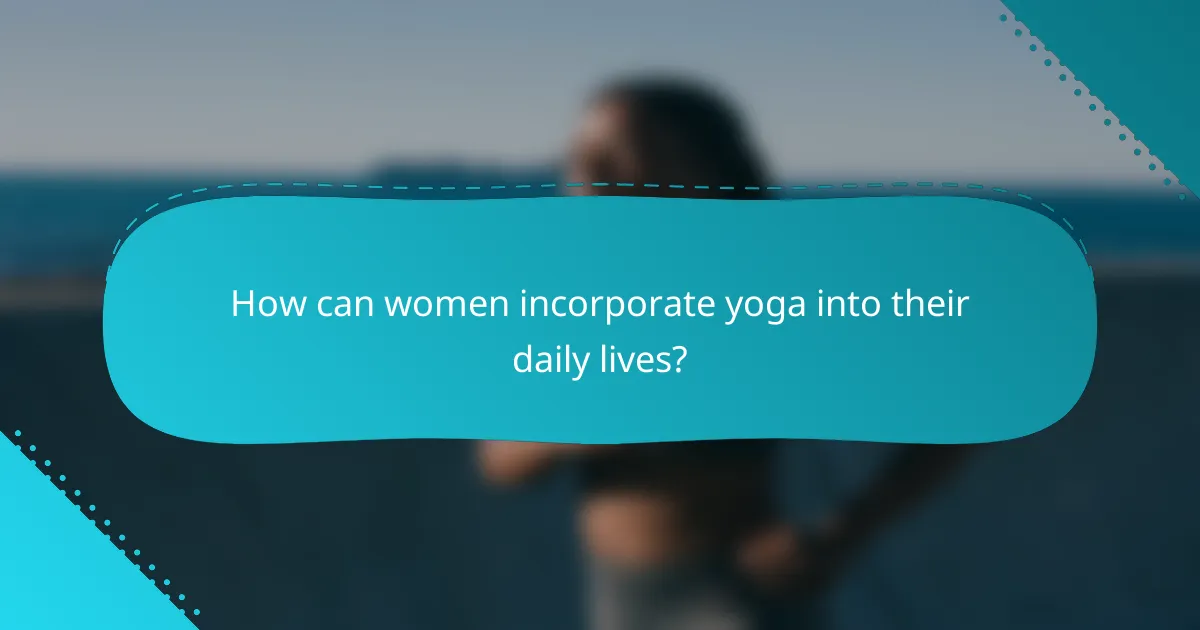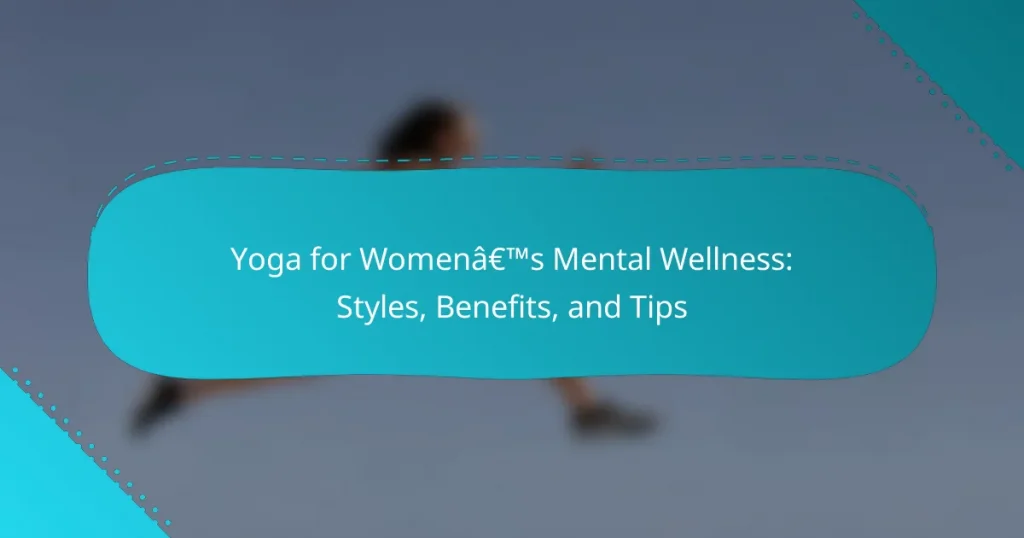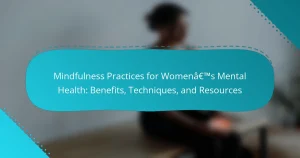Yoga significantly enhances women’s mental wellness by reducing stress and improving mood. This article explores various styles like Hatha and Restorative, highlights key benefits such as lower anxiety levels, and offers practical tips for effective practice. Incorporating yoga into daily routines can lead to increased emotional resilience and mental clarity.

How does yoga enhance women’s mental wellness?
Yoga enhances women’s mental wellness by reducing stress, improving mood, and fostering mindfulness. Various styles, such as Hatha and Restorative, cater to different needs. Research indicates that regular practice can lead to lower anxiety levels and increased emotional resilience. Tips for effective practice include setting intentions, focusing on breath, and integrating meditation.
What are the mental health benefits of practicing yoga?
Practicing yoga offers numerous mental health benefits for women, including reduced anxiety and improved mood. Regular yoga sessions can enhance mindfulness, leading to better emotional regulation. Studies show that yoga can lower stress hormone levels, promoting relaxation and mental clarity. Additionally, specific styles like Hatha and Yin yoga are particularly effective for fostering a sense of calm and resilience.
Which yoga styles are most effective for mental wellness?
Hatha, Vinyasa, and Kundalini yoga styles are most effective for mental wellness. Hatha yoga promotes relaxation and stress relief, while Vinyasa offers dynamic movement that boosts mood. Kundalini focuses on breath and meditation, enhancing emotional balance. Each style uniquely contributes to mental health through physical postures, breathing techniques, and mindfulness practices.
What distinguishes Hatha yoga in promoting mental wellness?
Hatha yoga promotes mental wellness through its emphasis on breath control, mindfulness, and physical postures. These practices enhance emotional regulation and reduce stress. The slow-paced nature of Hatha yoga allows for introspection, fostering a deeper connection to one’s thoughts and feelings. This unique attribute makes it particularly effective for women seeking to improve mental health. Regular practice can lead to increased resilience and a greater sense of calm.
How does Vinyasa yoga contribute to emotional balance?
Vinyasa yoga significantly enhances emotional balance by promoting mindfulness and reducing stress. This dynamic practice encourages the synchronization of breath and movement, fostering a meditative state that calms the mind. Studies indicate that regular Vinyasa sessions can lower anxiety levels and improve overall mood. The unique attribute of this style is its fluid transitions, which create a sense of flow and connection, contributing to emotional stability. As a result, practitioners often report increased resilience to emotional challenges and improved mental clarity.
What role does Restorative yoga play in stress relief?
Restorative yoga significantly reduces stress by promoting deep relaxation and mindfulness. This practice utilizes props to support the body, allowing for prolonged poses that release tension. Research shows that restorative yoga decreases cortisol levels, enhancing emotional well-being. Additionally, its focus on breath awareness cultivates a sense of calm, making it an effective tool for women’s mental wellness.
What unique attributes of yoga benefit women specifically?
Yoga offers unique attributes that specifically benefit women, enhancing their mental wellness. These include stress reduction through mindfulness practices, improved emotional regulation via breath control, and increased body awareness fostering self-acceptance. Additionally, certain styles like restorative yoga promote deep relaxation, which can alleviate anxiety and depression symptoms. As a result, women often experience enhanced resilience and a greater sense of community through group classes, further supporting their mental health.
How does yoga address hormonal changes in women?
Yoga effectively helps women manage hormonal changes by promoting balance and reducing stress. Specific poses, such as restorative and gentle yoga styles, enhance relaxation and support hormonal regulation. Research indicates that regular practice can alleviate symptoms related to hormonal fluctuations, such as mood swings and anxiety. Additionally, yoga fosters mindfulness, which encourages a positive mental state during these transitions.
What are the social benefits of group yoga classes for women?
Group yoga classes for women foster community, enhance social connections, and improve mental wellness. Participants often experience increased feelings of belonging and support, which can reduce stress and anxiety. The shared experience of practicing yoga together promotes bonding and encourages open communication. Additionally, these classes provide a safe space for women to express themselves and share personal challenges, contributing to emotional resilience and empowerment.
What rare benefits of yoga should women consider?
Yoga offers several rare benefits for women’s mental wellness that can enhance their overall quality of life. One unique benefit is improved emotional regulation, allowing women to better manage stress and anxiety. Additionally, certain yoga styles, such as restorative yoga, can promote deep relaxation and a sense of inner peace. Women may also experience enhanced self-awareness, leading to greater body positivity and self-acceptance. Finally, engaging in yoga can foster a supportive community, which is vital for mental well-being.
How can yoga help with postpartum depression?
Yoga can significantly alleviate postpartum depression by promoting relaxation and emotional balance. It enhances mood through physical activity, mindfulness, and breathing techniques. Research shows that yoga reduces anxiety, improves sleep quality, and fosters a sense of community among new mothers. As a unique attribute, restorative yoga specifically targets relaxation, which can be beneficial for mental health during the postpartum period. Regular practice can lead to long-term emotional resilience and well-being.
What are the effects of yoga on anxiety disorders in women?
Yoga significantly reduces anxiety disorders in women by promoting relaxation and mindfulness. Research shows that regular practice can lower cortisol levels, enhance mood, and improve overall mental health. Specific styles, such as Hatha and Restorative yoga, are particularly effective due to their focus on breath control and gentle movements. Additionally, group classes provide social support, which can further alleviate anxiety symptoms. Engaging in yoga consistently leads to long-term benefits, making it a valuable tool for women’s mental wellness.

How can women incorporate yoga into their daily lives?
Women can incorporate yoga into their daily lives by dedicating specific times for practice, even if just for a few minutes. Start with morning stretches or evening relaxation routines to enhance mental wellness.
Consider integrating various styles, such as Hatha for beginners or Vinyasa for a more dynamic practice, to keep it engaging. The benefits include reduced stress, improved focus, and emotional balance. Utilize online resources or local classes to find guidance and community support.
Establishing a consistent routine, such as practicing three times a week, can significantly boost mental clarity and overall well-being. Experimenting with different environments, like practicing outdoors or in a quiet room, can enhance the experience.
What are the best practices for starting a yoga routine?
To start a yoga routine effectively, focus on consistency, choose a style that resonates with you, and set realistic goals. Begin with short sessions, gradually increasing duration and complexity. Incorporate mindfulness practices to enhance mental wellness. Consider joining a class for guidance and community support.
How can women tailor yoga practices to their specific needs?
Women can tailor yoga practices to their specific needs by focusing on styles and techniques that enhance mental wellness. Incorporating restorative yoga can help alleviate stress and anxiety, while vinyasa can boost energy and mood. Modifications, such as using props, can accommodate physical limitations or menstrual discomfort. Additionally, setting intentions and practicing mindfulness can deepen emotional resilience. Regular practice can lead to improved mental clarity and emotional balance, essential for overall well-being.
What modifications can be made for beginners?
Beginners can modify yoga practices by focusing on gentler styles, using props, and adjusting poses for comfort. Incorporating restorative yoga can enhance mental wellness while being accessible. Emphasizing breathwork and mindfulness techniques further supports relaxation and stress relief.
How can women adapt yoga for different life stages?
Women can adapt yoga for different life stages by modifying poses, focusing on specific benefits, and incorporating supportive practices. During pregnancy, gentle styles like prenatal yoga enhance relaxation and prepare for childbirth. Postpartum, restorative yoga aids recovery and mental wellness. Menopause can benefit from calming practices that reduce anxiety and improve mood. Additionally, women experiencing significant life changes may find mindfulness and breathwork beneficial for emotional balance. Tailoring yoga practices to these stages fosters mental wellness and resilience.
What common mistakes should women avoid in their yoga practice?
Women should avoid common mistakes such as comparing themselves to others, neglecting proper alignment, and skipping breath awareness in their yoga practice. These errors can hinder mental wellness and progress. Focusing on personal growth, maintaining mindfulness, and listening to one’s body enhances the benefits of yoga. Prioritizing self-compassion fosters a more enriching experience.
What expert tips can enhance the yoga experience for women?
To enhance the yoga experience for women, focus on mindful breathing, selecting the right style, and creating a supportive environment. Mindful breathing promotes relaxation and centers the mind, essential for mental wellness. Choosing styles like restorative or yin yoga can specifically target stress relief. Additionally, practicing in a comfortable, inviting space fosters a positive atmosphere, enhancing overall engagement and effectiveness.



